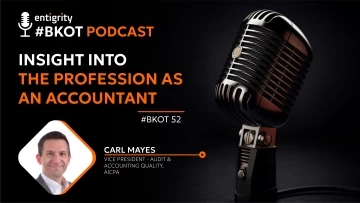This is the eleventh episode of our series BKOT: Build a KickAss Offshore Team. The title of the video, as it suggests, Practice Management & Development. Watch the whole podcast to know more.
#BKOT 11: BUILD A KICKASS OFFSHORE TEAM
PRACTICE MANAGEMENT & DEVELOPMENT
Hosted by: Chris Rivera, Director Client relations, Entigrity Offshore Staffing
Guest: Frank Stitley, CPA, Owner, Stitley & Karstetter
Chris: Hello everybody I am Chris Rivera, Director Client Relations with Entigrity Offshore Staffing and I hope everybody out there is safe and sound heading into this labor day weekend if you're doing some plans or traveling make sure stay socially distant as much as you can so we can get through this crazy times, and I'm very excited to announce a special guest with me today Frank Stitely, he's the owner of Stitely & Karstetter CPA in the Washington DC area he's been doing this for almost 30 years now and we look forward to some input on Practice Management and Development, so we're gonna talk about that in a second but Frank please introduce yourself and give us some background and take it away.
Frank: Thanks Chris I'm really happy to be here. This is a fun topic for me. I've been speaking about it a lot since April as you can imagine I am the managing partner of Stitely & Karstetter CPA, we're a local firm located just west of Washington DC. I'm also the CEO of clarity practice management which is cloud-based practice management software for CPAs and accountants. this has been a weird year, this is the tax season and never really ended for us. I hope someday it does just in time for next year.
Chris: Right it's between the extensions and then the PPP loans and it's just one thing after another a couple deadlines coming up and then we get to breathe and then right back into the traditional season so with let's get to it with firms you know hopefully not scrambling anymore but the idea of a practice management and development situation here so talk to us about that you're not only the owner of a CPA firm but you have a company here that provides great value so can you just break it down a little bit some of the basics and then you know kind of where were firms should start.
Frank: Sure, practice management to me or effective practice management is putting the right people in the right places with the right resources at the right times what that means is that deliverables to your clients, tax returns, compilations reviews, bookkeeping, bankrupts, follow a standardized system from beginning to end so that you know where everything is in your practice. Just this morning I do what I call a project scrub where I went top to bottom through every project, I'm in charge of which is about 120 right now and what I’m looking for is projects that are hung up in process the best way or I should say the worst way to end up with a dissatisfied client is a client who contacts you after three weeks because you haven't been in any contact with them yet.
Chris: Yeah absolutely, it's very important to never forget about them they're the most important part and so in going along with what some of the best practices that you do and that you recommend and how you kind of work with the firms.
Frank: The best practices to me centre around creating a workflow for your firm that's first of all customized to your workflow and also makes sense we do a lot of work both with our CPA firm and with clarity practice management with lean six sigma principles which basically say any step that either isn't required by the government or doesn't deliver value to a client has to go and that shows up in some weird ways, for instance, When you scan? How do you scan? When you ask questions of clients? How many levels of reviews do you do? it's a balancing act and you have to be deliberate about how you design those systems.
Chris: Yeah lean six sigma is a great process in place to kind of identify and also make sure everything is streamlined and so if the firm's trying to implement this now right newer firms out there trying to get their feet off the ground where they should start.
Frank: I would start with diagramming what your current process looks like from beginning to end. write down every step and very simply at the beginning start out with who's responsible is the firm responsible or is the client responsible that's sort of the first level and I can tell you that the biggest problem in practice management is that we don't bring clients into the process or don't consider them a part of it they tend to be pretty much the biggest hang up sometime if we're not communicating with them if they don't know what they're supposed to do and when and then after you've diagrammed the current process then start putting in who actually within the firm carries out those tasks and then finally you come back to it and you say okay that's what we're doing what might we be doing in a better way if we step back at a 30000 foot level and say hey we have 25 steps to delivering a personal tax return, is there any wonder it takes us 4 weeks to get that done maybe we can cut it down just a bit.
Chris: Absolutely you want to make sure especially with the client that you properly onboard them right and so having a view of what you're doing now right you got to find what works what doesn't work and obviously what doesn't work, how do you fix that? and that kind of leads us into you know the technology that's out there the cloud technology and so I mean firms have moved over to being virtual are they fully virtual sure, they're partially virtual sure but the idea of the technology in place first off there's so many solutions so and where should somebody start.
Frank: I think you have to start with looking at who works a lot with accountants, CPA’s bookkeepers and the reason for that is you want to find a vendor that has an existing relationship with whatever tax software vendor you're using like a CCH or a pro series we've been virtual entirely now for about 7or 8 years and the great thing about the IT firm we use is that if we have a technical problem with say CCH tax software they contact the vendor we don't have to contact the vendor and try to pretend that we're technical enough to try to figure that problem out so that's where you start you want to start with somebody who does this a lot who's already run the applications you're going to run. I think the average CPA I saw uses somewhere around 50 applications in the course of a week that's a lot and if you think about it that's true we have all kinds of little utility stuff and you really need to start with having a firm that understands those applications.
Chris: Absolutely well said yeah the you got to start somewhere and a lot of times though there's hesitations and so I see a lot of firms just having being stuck in their own ways and you know it's not broke right so why fix it but it just there's a lot of hiccups still so why do you there are hesitations and how should someone kind of overcome that?
Frank: Well I think one of the biggest hesitations is security and I think that's one of the real strengths of actually going to the cloud if you think about it no small business can afford the level of security the level of security hardware and appliances that are necessary to keep your data safe the bad guys aren't anymore a 15 year old trying to change the geography grade the bad guys are using robotic process technology and they harvest all the data they can get they then go back later and say hey what can we do with this data and guess what CPAs and tax preparers have we have direct deposit information which is almost the holy grail of information because they can steal money directly from people this way, the reason we went to the cloud was almost entirely security because we realized that we had no possibility at our firm size of being able to afford what we needed and the people we work with have full-time people who do security all day long it's not a hundred percent my wife's in cyber security she says there's no such thing as secure there's only levels of risk and in the cloud your levels of risk are many times fewer than they are with on-premises servers.
Chris: Yes well said yeah there's no such thing as when it's fully secure or even privacy anymore I look at all these I read the fine print whether you go to a bank or you're just reading contracts and it's like what can you change about what companies disclose and it's like nothing it's like okay right so now it's very important to make sure one reputable company you know try to work with the one you're with now see how they have everything being implemented and just let's now put in back to the client right so onboarding and showing the clients and so how do you reassure if somebody's just used to bringing in documents or used to one-on-one meetings and then all of a sudden they have to send things digitally you know so there are hesitations there how, what would you say you could recommend kind of how to make the clients a little bit more at ease with this?
Frank: I think the hesitation is probably more in the CPA and accounting firm's mind than it is with the clients they're doing e-banking, they're doing amazon, they're doing facebook, they expect to interact digitally with their major service providers brokerages you basically can't talk to a brokerage person anymore if you try to get in contact with some of the major ones they expect us to be digital and it really and the pandemic really just accelerated a trend in our firm over 75% of our clients loaded all their documents to clarity and we took it from there this past year with the pandemic it was 85% it gives you an incredible set of efficiencies and if you are careful and manage the relationships with clients it is zero hurdle.
Chris: Absolutely and I see that too where the one or two of the partners or associates mindset encompasses what maybe 50 or 100 people are thinking right and so you're absolutely right when saying that you know you haven’t even asked the client you know and so if you're thinking this everyone else is absolutely right no, it's the clients may be wanting to do that and so they're just waiting for you to tell them you know it's your job to kind of lead them and guide them along the way and make them feel comfortable through this so yeah, absolutely right so all right so we got practice management place talk about some of the cloud technology you know security being the number one question and concern now you know we're remotely working right, so you have got you guys virtual last seven eight years but are you still working remotely or how's that set up right now?
Frank: Right now we're working sort of how employees want to work okay we have people coming in two to three days a week I do what I've done for probably a half dozen years as I work sort of hybrid days I'll come into the office and work for five hours to be available to staff and then I go home and get my real work done work for a few hours at night when it's relaxing and I can also beat the traffic that way I mean I can leave the office at two o'clock beat the DC traffic and I'm home and I'm happy and I'm ready to work again without any interruptions for a few hours.
Chris: Absolutely, it’s in most companies in other industries because remote working because it's been around since the 80s it's nothing new it didn't start you know and back in March or April this year many industries do not have offices there are fully virtual but yes in the accounting industry here we see that must go into an office must be in a controlled environment per say but no you got to have the flexibility you're absolutely right if you want to go into the office for your specific duties or tasks go in if you want just a different environment flexibility especially if firms are looking to hire now it's going to be for the potential candidates going to be very appealing to them and so having that flexibility and then making sure that they're still being held accountable what the expectations are but you got to have the flexibility and the mindset of always having to be in the office is the only way to get things done it's not the case whatsoever right so you have to be able to understand the environment speak with your associates you know gate their thoughts be collaborative and the approach to how you're going to be working with your firm and the staffing challenges I've seen a lot of firms where some of the employees do not enjoy working remotely or they don't know how to work remotely you know have you experienced that and if you have you kind of what where's some guidance on assisting new employees or current employees in that type of environment?
Frank: I've gotten a lot of feedback from a lot of firms after what happened basically with the shutdown on March 15th and initially everyone's thought was productivity went straight into the toilet but when we sat back and we analysed that a little bit what we really found out was that for the most part clients had slowed down responding to us and a lot of them didn't really care about the third week in March about April 15th anymore so I think we found out internally and a lot of other firms found out it wasn't so much a productivity problem but what I would say is you should think about helping your employees stay productive and by that I mean putting their homes first of all finding out what they have for a home system making certain they have a router that's set up correctly and consider putting them on your tech support plan what that does first of all is that it ensures that they have all the same security tools you have and also take a look at what they need in terms of printers and scanners when we saw this was coming we basically went around the office to everybody and said what do you need at home for the most part it was monitors and we happened to have all kinds of I overbought monitors somehow so we just gave everybody monitors and said go you know and it worked out.
Chris: Yeah! it's you hit it on the dot with dependable Wi-Fi helping them set up I'm in New York city and so there's a lot of instances where friends and colleagues they don't pay for wi-fi they're using the neighbour’s or the free public Wi-Fi and it's important to have good wi-fi for security too but most importantly yeah create an office environment right so it’s very important I had a one of my clients and he was sitting on a workout ball and he just kind of skipped the table because the kids were using the chairs and he's just like I can't do this anymore and so you know you think you're working at home oh yeah just lay on the bed you're going to fall asleep or I could just kitchen table and then but yet you have everybody home and the distractions are there so yeah you got to set up a comfortable environment that you could be productive in because there's a lot of distractions got to be disciplined time management and so the next thing right so now you have a remote working has opened up the eyes especially the accounting community that remote could be anywhere right it could be down the street be in DC it could be in New York or it could be overseas offshore right so what are your experiences with offshore staffing and working in that type of environment?
Frank: I should maybe start out with we've had a group of about 15 remote part-time employees working with us for at least a dozen years so we were familiar with that a little bit but this past year we got into offshore staffing and it works the same as it does having an employee in Arizona you know for instance because you have time challenges there as well the key thing is that you've got to have well-established processes so that they can work with you the way an employee in the office can obviously they can't walk around the corner and ask a question so you need some kind of collaboration platform where they can leave a message and you can leave a message back and that works for us we use our clarity practice management system for it but you can also set up teams you can set up a whole bunch of slack a whole bunch of environments that allow for collaboration and to us it really worked great now we have access to an international talent pool when we were starting to think back last October we had tapped out pretty much the U.S. client talent poll.
Chris: Yeah exactly! so the remote team in place great now you have an offshore team assisting and yeah it's the talent that's available out there people just think it's an American workforce and it's always been a global workforce and now it's made them realize let's explore it and see the options out there I mean as long as they're dependable and then they're experienced and they are comfortable in that type of environment working with you and you interview them and this is you treat it like it's your own employee just because it's remote and you may not ever see them there's so many tools and technology out there that you need to utilize and understand and access this town and be able to take off you know certain gaps in your firm right they have the ability to do data entry they have the ability to do team leads or mid-level management set up the projects for the senior level and then or you need senior level you know assisting everybody and makes overviewing the work a lot of times I see the backlog or what's being bogged down is the reviewers right so you need more of them and so you need to you know assess what you have now see where you can grow opportunities and bottom lines how you can help out your clients is the most important thing.
Frank: You hit the nail on the head with the reviewers because that's a big issue for us internally it's very hard to find reviewers so this coming year we're going to hire offshore staff to be doing some reviews and the time difference really turns out to be more of a benefit than a hindrance because you can assign a return at 4pm eastern time you come back the next morning and the questions are ready for you to send to the client I mean you really almost pick up a day that way.
Chris: Yeah! it's like how you're no more late nights or anything like that you just assign the work absolutely they're starting it while we're here sleeping you have somebody beginning that work it's on your desk ready for review and there's just so many more benefits to the time zone difference than there are you know any type of cons to it absolutely, so well I wanted to thank you again for joining me is there anything else that you wanted to mention to our audience or talk about right now Frank?
Frank: Just that I think the way to get started is to get started we have a limited amount of time before January and February are back around and we don't know how we're going to be working next year so I think going remote and considering offshore staff to beef up your internal teams I think is the way to go.
Chris: Absolutely if you what to say if you failed the plan then you plan to fail pretty much so make sure that if you if anything was to happen another pandemic or anything other that's catastrophic or just a disturbance you're ready for it right having everything in place having a remote team local team bring it on you know you'll be able to overcome anything nowadays and so it's very important and keeping an open mind and be able to facilitate for all your employees be that leader in your firm and then the clients will just come to you because they trust you they like you and they'll be there for you, so alright well Frank thank you so much for joining with me today any plans for the holiday weekend?
Frank: Not really for the holiday but I will tell everybody that over September 15th I'll be working from the beach at Emerald Island and last year I did the October 15th deadline and I've worked the final four I've gone to the final four NCAA tournament nice work from there so that's what remote work that's how it could be fun.
Chris: Yeah, absolutely I'm doing I'm taking a little mini vacation myself I'm leaving tonight but I'm doing another podcast tomorrow and remotely and that's the best part of it helping and educating our audience but yeah you can be wherever you're wherever you want to be and on the beach, that's great yeah so awesome well to our audience out there thank you so much for listening in hope you guys learned some things today be able to help you and your firm growth strategies and for now take care, thanks everyone for your time.

_1642676318-1686039629.webp)



